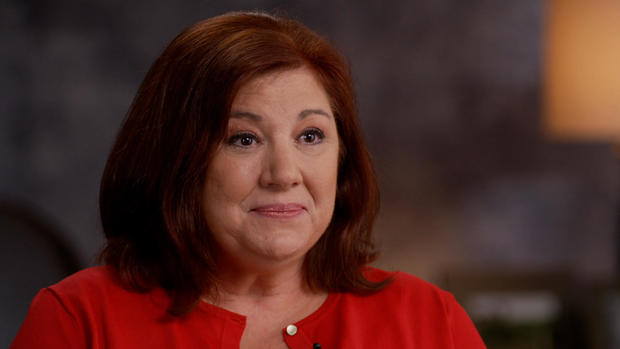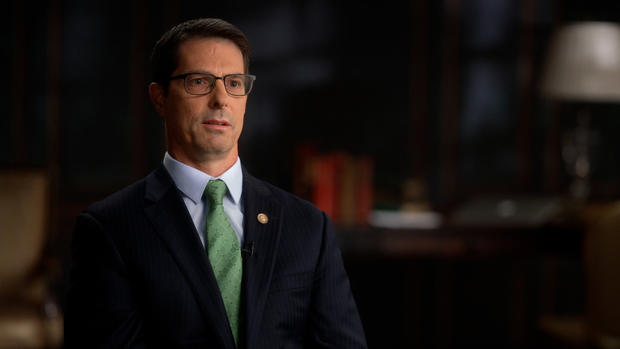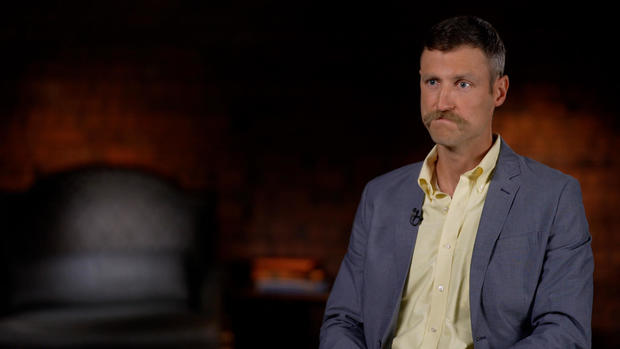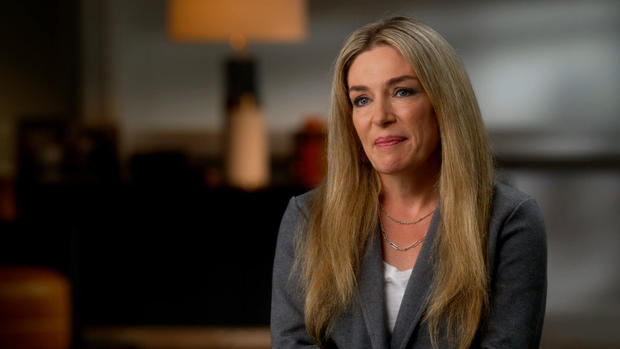In 1904, 180 Americans had been trapped by fireplace in a Pennsylvania coal mine. Two heroes went in to avoid wasting them, however the rescuers and all however one of many miners perished. Still, that act of heroism touched one of many richest Americans, a person whose metal mills had been fired by coal. Andrew Carnegie donated greater than $100 million, in as we speak’s cash, to acknowledge heroes within the U.S. and Canada. As we first reported in 2021 — a very good deal has modified in 118 years; 1000’s have been awarded the Carnegie Hero Medal and advances in neuroscience are revealing why a few of us could also be heroic. We’ll get to the science, however first, meet a number of the Carnegie Heroes, together with Terryann Thomas.
Terryann Thomas: I bear in mind pondering simply virtually immediately, “I’m not gonna let anyone die.”
Terryann Thomas was a civilian overseeing confiscated property on the headquarters of the Topeka Police Department. In 2015, an agitated man got here into the basement property room to demand his bicycle. Thomas turned to seek out it.
Terryann Thomas: As quickly as I rotated and began to stroll off, I heard a scream.
The scream got here from officer Tammy Walter. For causes we do not know, she’d been attacked by the person within the property room ready space. Thomas hit a panic alarm and charged out of her locked room.
Terryann Thomas: And so, as I ran on the market, I noticed there was blood on the wall and he or she was down. And she was not transferring. And I went over there, and I pulled him off of her. He checked out me and he punched me within the face. He rotated and he began again on her. He’s kicking her whereas she’s on the bottom, and consistently punching her, so I went and grabbed him once more and I pulled him off.
Help was sluggish in coming. It appears nobody had triggered the panic alarm earlier than. So, the cops upstairs weren’t certain what it meant.
Terryann Thomas: He grabbed one thing off her gun belt. And I assumed, “Okay, he has her gun, this entire factor has simply modified.” He hit the elevator button and he checked out me and he stated, “You’re coming with me.”
Later, it turned out it was the officer’s radio the person had, not her gun, however Thomas did not know that within the struggle.
Scott Pelley: What occurred then?
Terryann Thomas: And so I put my foot within the door. It opened up. And with all the pieces I had, I grabbed him and I pulled him outta the elevator. And simply as quickly as we received out, I ran to the door. I opened it and I simply began screaming. And that is when all of the officers got here in and took him down.
A Topeka cop reported that story to the Pittsburgh headquarters of the Carnegie Hero Fund Commission. Eric Zahren is president of the fee. He’s a former Secret Service agent.
Eric Zahren: Well we have a look at as much as 1,000 instances a 12 months. And we award about just a bit over 10% of that. So, lately, that equates to about 80 instances a 12 months.
Scott Pelley: How do you outline, “hero?”
Eric Zahren: And we outline it as, a minimum of by way of our medal-awarding requirement, as a person or a lady that willingly and knowingly dangers their life to a unprecedented diploma to avoid wasting or try to avoid wasting the lifetime of one other human being.
Scott Pelley: What are a number of the issues that your investigators undergo once they’re investigating a case?
Eric Zahren: We write to or contact police departments, fireplace departments, the sufferer within the case, who was the rescued celebration, and different eyewitnesses to the act and we begin to construct an understanding of every case.
The Carnegie Medal, molded in bronze, comes with $5,500 and different monetary help.
Eric Zahren: We additionally pay for funeral prices totally for a hero that’s killed within the act. We pay any medical prices for any harm that they incur, to incorporate psychological after-effects, PTSD. We do not current a medal and stroll away. We keep there. And we keep there for the hero’s lifetime and generally far past. I imply, we had been not too long ago a case that, you know– a gentleman was killed in his heroic act. And we supported his spouse, after which one in all his daughters for a complete of 72 years till his daughter died.
Pete Pontzer: On the seaside on that day, I simply reacted.
Pete Pontzer match the Carnegie definition of hero. He was on a North Carolina seaside in 2015 when somebody pointed to a boy swept away by a rip present. Pontzer and one other man swam about 150 yards.
Pete Pontzer: And we discovered a younger teenager, 13-year-old boy. And water was beginning to wash over his face.
Pete Pontzer: As we get to the seaside, a church youth group chief comes out and meets with us. And he says, “Thank you. There’s one other one.”
A second boy was drowning.
Pontzer ran, broke his foot, ignored it, and swam out. He ultimately overlooked the boy however the youngster was pulled from the water by others and flown to a hospital.
Scott Pelley: So why you?
Pete Pontzer: I did not give it some thought. It’s sort of like should you put your hand on a scorching range and pull it again straight away with out pondering. That’s sort of what it was like for me. It simply wanted to be executed and I did it.
It was the identical response for David McCartney when destiny arrived on a two-lane highway in Indiana.
David McCartney: I used to be heading south. And there was a car that appeared prefer it was going somewhat bit left, somewhat bit proper. Then abruptly, it went proper. And it hit a culvert.
Scott Pelley: What occurred subsequent?
David McCartney: You might begin seeing smoke, it was beginning to bellow out and you might begin listening to, Miss Testerman, who I come to seek out out, was beginning to scream as a result of the car was really beginning to catch on fireplace.
Elizabeth Testerman was trapped.
David McCartney: She’s sitting there screaming. Underneath, the sprint is on fireplace. The smoke’s simply going by way of your nostril. And you are attempting to determine, properly, what to do now.
McCartney and one other man kicked in her windshield and minimize her seatbelt with a knife.
David McCartney: We pull her toes out. And then we kinda wiggle as much as that windshield that was kicked out. And then we pulled her over to the grass and laid her down.
A minute later, he advised us, the automotive exploded. That worry of dying in a automotive is well-known to Abigail Marsh. She’s not a hero however she was saved by one. At age 19, she was on an interstate at evening and swerved to overlook a canine. She went right into a spin which left her dealing with lanes of high-speed site visitors in a automotive she could not restart.
Dr. Abigail Marsh: And I spent some period of time 100% sure I used to be about to die. I imply, I used to be, SNAP , any one in all these automobiles hadn’t swerved in time, and I undoubtedly woulda been useless.
Scott Pelley: What occurred?
Dr. Abigail Marsh: I hear a rap on the passenger aspect window and I see a person’s face staring into my automotive. And he stated, “You appear to be you might use some assist.”
The stranger received her automotive began and drove her to security. His act of heroism led her to grow to be Dr. Abigail Marsh, a neuroscientist who research what will get into the heads of heroes. At Georgetown University, she has printed research on the brains of two varieties of individuals — psychopaths who haven’t any compassion for others and individuals who have a lot compassion that they donated a kidney to a stranger. She discovered a hanging distinction in a pair of tiny constructions close to the underside of the mind known as the amygdalae. They subconsciously acknowledge hazard and react sooner than acutely aware thought.
Dr. Abigail Marsh: One of the large issues that we all know they do is that they’re answerable for producing the expertise of worry. What’s fascinating about that’s that, not solely is the amygdala important for giving you the expertise of worry, it appears to let you empathize with different folks’s worry
As her topics had been scanned, Marsh confirmed them emotional faces.
Dr. Abigail Marsh: And whereas people who find themselves psychopathic present very minimal responses within the amygdala once they see a frightened face. People who’ve given kidneys to strangers have an exaggerated response within the amygdala, which we expect implies that they’re extra delicate than most individuals to others’ misery, higher at decoding when different persons are in misery. More prone to choose up on it.
Perhaps like the person who saved her on the freeway.
Scott Pelley: No telling what number of psychopaths drove previous you that evening. (LAUGHTER)
We questioned whether or not our Carnegie Heroes had been born heroic. Was there a distinction of their brains? All three volunteered for Dr. Marsh’s scans.
Dr. Abigail Marsh: To my– I’m not gonna lie, it was I used to be actually happy and gratified by what we discovered within the heroic rescuers, which is that, similar to the altruistic kidney donors, their amygdalas had been bigger than common and considerably extra conscious of the sight of anyone else in misery. Which makes a lot sense, I imply, these are the individuals who, once they noticed anyone terrified as a result of they thought they had been about to die, they did not simply sit there.
Scott Pelley: You know, they’ve all advised us that they sprang into motion, as you say, with out pondering.
David McCartney: You do not suppose, you just– you are strictly performing
Pete Pontzer: I did not give it some thought.
Terryann Thomas: I did not even give it some thought.
Dr. Abigail Marsh: It actually is sensible when you consider how historic and deep in our mind constructions just like the amygdala are. And I would not need to say that the amygdala is the place altruism is within the mind. It’s one hyperlink in a really lengthy chain of occasions that is taking place that takes us from seeing that anyone’s in peril to really performing to assist them. But we all know that it is undoubtedly an important hyperlink in that chain whether or not you’re a mouse or a rat or a canine or a human it is performing the identical capabilities at a very deep, quick, unconscious degree.
If the act of heroism is a dash, the implications are a marathon. For David McCartney it was for the higher. He’s the primary to confess he wasn’t a very good man. In the previous, he’d pleaded responsible to battery. But he promised the girl he pulled from the burning automotive that he would do good. And in 2019, he donated a kidney.
Scott Pelley: Who did the kidney go to?
David McCartney: I’ve no clue.
On the opposite hand, for Terryann Thomas, heroism has been troubling, she wasn’t in a position to return to work within the police property room.
Terryann Thomas: I had a tough time. I nonetheless have a tough time.
And it has been a tough time for pete pontzer who was left with remorse. That second boy he couldn’t attain, was flown to a hospital, however didn’t survive.
Pete Pontzer: A hero would’ve gotten the second as properly. And that is a problem that I all the time reside with. I simply could not get the second child.
His remorse was coupled with curiosity concerning the boy he saved seven years in the past. The boy whose identify he by no means knew.
Scott Pelley: The younger man that you simply saved is called Sebastian Prokop. And we discovered him. And he had one thing that he needed to say to you. So let me introduce you.
Sebastian Prokop in video: I’m Sebastian Prokop. I’m 18. I not too long ago graduated from highschool and I’m working towards going to school, getting a automotive, all that good things. Thank you to the one who pulled me out and let me be capable of obtain all of the milestones that I’ve received and that I plan to get.
Pete Pontzer: Thank you, Scott.
Scott Pelley: What is it wish to see him as we speak?
Pete Pontzer: It kinda takes my breath away, Scott. It helps to carry some closure and a few assist.
Help for heroes has been the mission of the Carnegie Fund for 118 years, it has bestowed 10,000 medals and awarded $40 million. Back in 1904, Andrew Carnegie sensed what science has now confirmed. Heroes, he stated, can’t be created—they act on an impulse—a mysterious reward to the few.
Produced by Aaron Weisz. Associate producer, Ian Flickinger. Broadcast affiliate, Michelle Karim. Edited by Craig Crawford.



















Discussion about this post